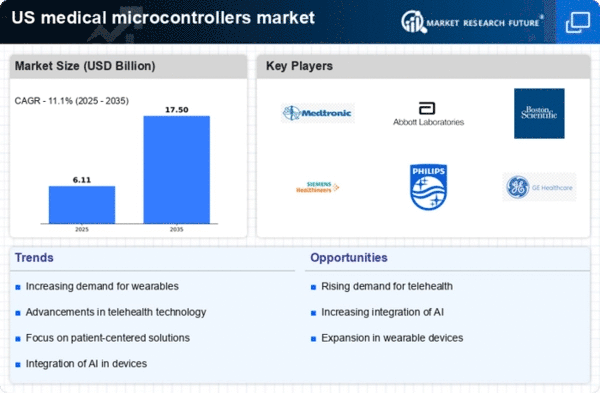Advancements in Telemedicine
The expansion of telemedicine services is driving the medical microcontrollers market as healthcare providers increasingly rely on remote monitoring solutions. Telemedicine enables patients to receive care from the comfort of their homes, which has become particularly relevant in the current healthcare landscape. The market for telehealth services in the US is expected to exceed $20 billion by 2026, highlighting the need for reliable medical devices equipped with advanced microcontrollers. These microcontrollers must support real-time data transmission and ensure patient safety through secure communication protocols. As telemedicine continues to evolve, the demand for sophisticated microcontroller solutions that can facilitate remote patient monitoring and data analysis is likely to grow, thereby enhancing the overall medical microcontrollers market.
Rising Demand for Wearable Health Devices
The increasing consumer interest in wearable health devices is a key driver for the medical microcontrollers market. As individuals seek to monitor their health metrics, such as heart rate and blood glucose levels, the demand for compact and efficient microcontrollers rises. In 2025, the wearable health technology segment is projected to reach approximately $30 billion in the US, indicating a robust growth trajectory. This trend necessitates advanced microcontroller solutions that can handle complex data processing while maintaining low power consumption. Consequently, manufacturers are focusing on developing microcontrollers that are not only cost-effective but also capable of integrating seamlessly with various health monitoring applications. The medical microcontrollers market is thus positioned to benefit significantly from this growing trend, as innovations in microcontroller technology are essential for the advancement of wearable health devices.
Increased Focus on Patient-Centric Solutions
The shift towards patient-centric healthcare solutions is significantly influencing the medical microcontrollers market. Healthcare providers are increasingly prioritizing personalized treatment plans and patient engagement, which necessitates the development of advanced medical devices. This trend is reflected in the projected growth of the patient monitoring device market, which is anticipated to reach $15 billion by 2025 in the US. Medical microcontrollers play a crucial role in enabling these devices to collect and analyze patient data effectively. As a result, manufacturers are investing in microcontroller technologies that enhance device functionality and improve user experience. This focus on patient-centric solutions is likely to drive innovation within the medical microcontrollers market, as companies strive to meet the evolving needs of healthcare providers and patients alike.
Emerging Applications in Diagnostics and Treatment
The emergence of new applications in diagnostics and treatment is a significant driver for the medical microcontrollers market. As healthcare technology advances, there is a growing need for microcontrollers that can support complex diagnostic tools and treatment devices. The diagnostics market in the US is projected to reach $25 billion by 2027, indicating a strong demand for innovative solutions. Medical microcontrollers are essential for enabling devices that perform real-time analysis and provide accurate results. This trend is pushing manufacturers to develop microcontrollers that are not only efficient but also capable of integrating with various diagnostic platforms. Consequently, the medical microcontrollers market is poised for growth as it adapts to the evolving landscape of healthcare diagnostics and treatment.
Growing Regulatory Support for Medical Innovations
Regulatory bodies in the US are increasingly supporting innovations in medical technology, which is positively impacting the medical microcontrollers market. Initiatives aimed at expediting the approval process for new medical devices are encouraging manufacturers to invest in research and development. The FDA has introduced various programs to facilitate the entry of innovative medical devices into the market, which is expected to enhance competition and drive growth. As a result, the medical microcontrollers market is likely to see an influx of new products designed to meet stringent regulatory standards. This supportive regulatory environment not only fosters innovation but also ensures that patients have access to cutting-edge medical technologies that improve health outcomes.















